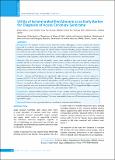Please use this identifier to cite or link to this item:
https://hdl.handle.net/20.500.14356/1570| Title: | Utility of Ischemia Modified Albumin as an Early Marker for Diagnosis of Acute Coronary Syndrome |
| Authors: | Mishra, Bijaya Pandey, Sunil Niraula, Surya Raj Rai, Bijendra Kumar Karki, Prahlad Baral, Nirmal Lamsal, Madhab |
| Citation: | MishraB., PandeyS., NiraulaS. R., RaiB. K., KarkiP., BaralN., & LamsalM. (2018). Utility of Ischemia Modified Albumin as an Early Marker for Diagnosis of Acute Coronary Syndrome. Journal of Nepal Health Research Council, 16(1), 16-21. https://doi.org/10.33314/jnhrc.v16i1.1002 |
| Issue Date: | 2018 |
| Publisher: | Nepal Health Research Council |
| Article Type: | Original Article |
| Keywords: | Acute coronary syndrome Human serum albumin Ischemia modified albumin |
| Series/Report no.: | Jan - Mar 2018;1002 |
| Abstract: | Abstract Background: The diagnosis of acute coronary syndrome remains challenging, as cardiac troponins and creatine kinase-MB do not detect myocardial ischemia. Ischemia modified albumin is biomarker positive within 6-10 minutes following ischemic onset, where oxygen free radicals leads to reduction in binding capacity of human serum albumin to transitional metal-cobalt. The objective of this study was to compare ischemia modified albumin between acute coronary syndrome patients and healthy controls, and evaluate diagnostic performance of ischemia modified albumin compared to cardiac troponins, creatine kinase-MB and electrocardiogram in acute coronary syndrome patients. Methods: Fifty ACS patients and 50 healthy controls were enrolled in this cross-sectional study. Ischemia modified albumin was measured after addition of known amount of cobalt to human serum albumin, followed by spectrophotometric determination of unbound cobalt fraction at 470 nm using dithiothreitol as coloring agent. Independent student t-test and One-way ANOVA to compare differences of mean between groups; diagnostic sensitivity and specificity of ischemia modified albumin was determined by receiver operating characteristic curve; McNemar-test was used to assess diagnostic performance of entire test parameters, when used alone and in combinations. Results: Ischemia modified albumin was significantly higher in acute coronary syndrome patients compared to controls (0.823±0.191 vs 0.410±0.081)(p<0.001). Receiver operating characteristic curve derived optimal cut-off of 0.475 Absorbance unit had sensitivity and specificity of 92% and 82% respectively (area under curve- 0.96). However, no significant differences in mean ischemia modified albumin values between three categories of acute coronary syndrome were seen. Sensitivity of ischemia modified albumin assay (92%) was significantly higher compared to electrocardiogram (72%), cardiac troponin I (18%), and creatine kinase-MB(42%). Conclusions: Ischemia modified albumin is elevated in acute coronary syndrome patients with better diagnostic performance compared to electrocardiogram, cardiac troponin I, and creatine kinase-MB for early diagnosis, however, with limited ability to discriminate between ST-elevation myocardial infarction, non-ST-elevation myocardial infarction and unstable angina. |
| Description: | Original Article |
| URI: | http://103.69.126.140:8080/handle/20.500.14356/1570 |
| ISSN: | Print ISSN: 1727-5482; Online ISSN: 1999-6217 |
| Appears in Collections: | Vol. 16 No. 1 Issue 38 Jan-Mar 2018 |
Files in This Item:
| File | Description | Size | Format | |
|---|---|---|---|---|
| 1002-Manuscript-3880-2-10-20180314.pdf | Full text Article | 383.55 kB | Adobe PDF |  View/Open |
Items in DSpace are protected by copyright, with all rights reserved, unless otherwise indicated.
